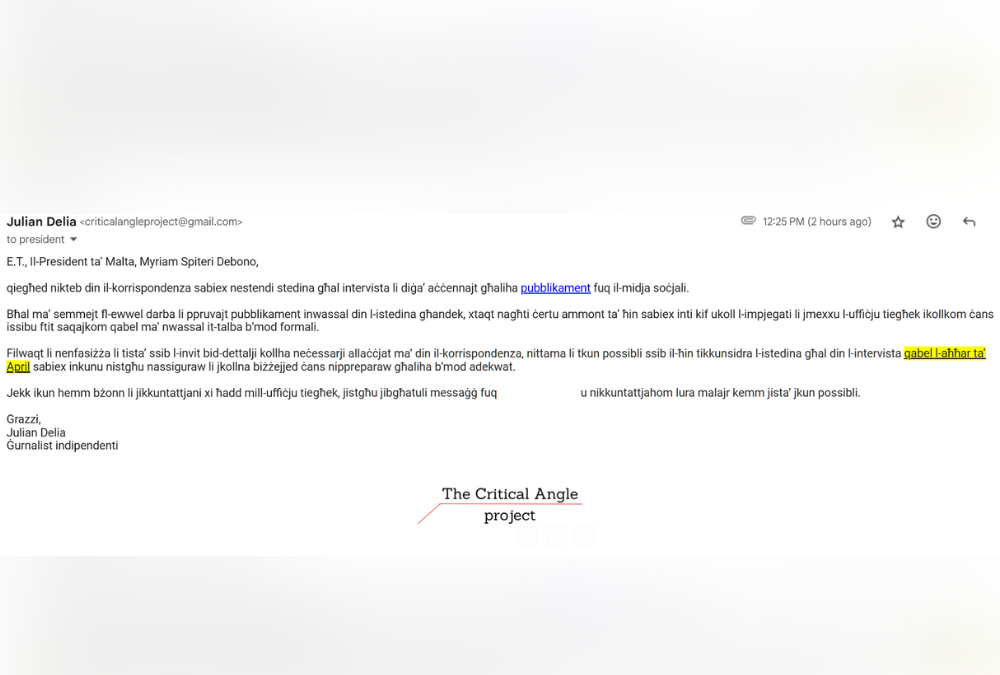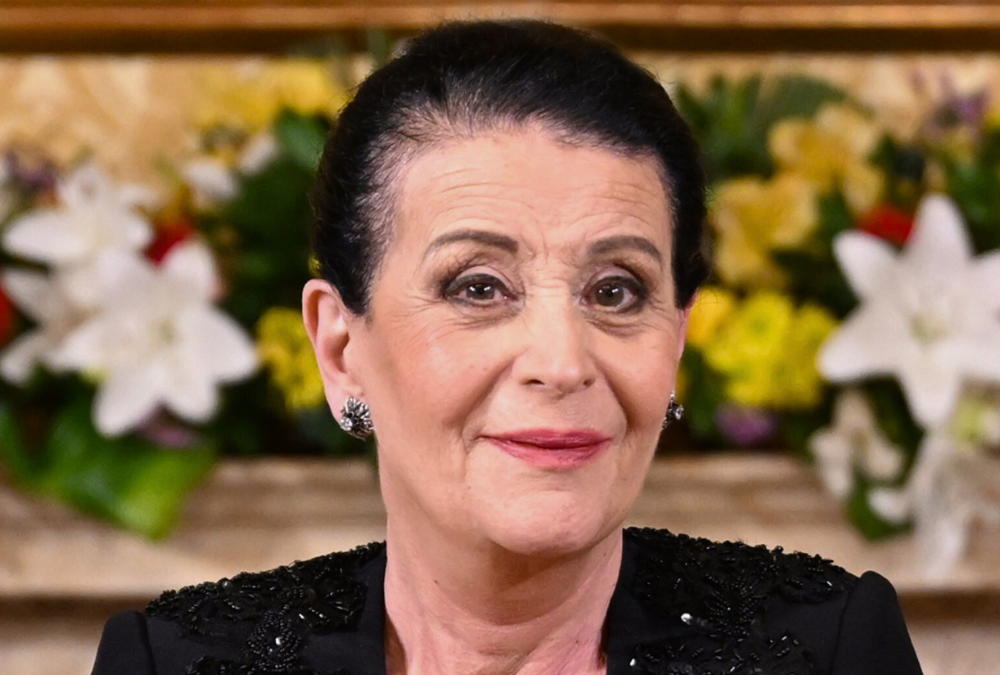As is custom, Her Excellency Myriam Spiteri Debono assumed the role of President of the Republic of Malta on 4 April of this year.
After following the new president’s opening speech, I issued a public statement on social media the following day. My proposition is simple: I’d like to interview the new president for one hour as part of the ‘SIEGĦA‘ project. The interview would be, in an ideal world, held closer towards what would be the 100th day of her presidency.
I had issued a statement on social media because it was quite clear that larger media houses had direct access which I didn’t have and that it would naturally take some time to set up the newly appointed president’s communications structures. Unless I missed something, the president has already appeared in at least five different interviews, three of which were held less than 72 hours after she was officially sworn in, indicating that those interview requests were made much earlier than that.
While I was expecting the office of the head of state to have a fully functional website by now (which would also include the name and email address of her communications spokesperson), it seems that at a Facebook page with an official email address was set up in the mean time. Since Spiteri Debono is apparently an avowed technophobe, we’ll let this one slide for now.
As promised in that original public statement, I formally sent my request for an interview earlier today, including a lengthy explanation as to why I took some issue with what she had to say about her hopes for the country’s future in the first speech she gave as president. I’m hoping I will be able to let readers know whether this interview is going to happen or not by today week.
 Now, to be clear, I understand perfectly well what the limitations of the role of the president are. I am aware that it is, structurally speaking, paradoxical: it is an office which bears the heavy burden of safeguarding the highest law of the country – the Constitution – without any real infrastructure to do any heavy lifting. The power of the presidency is symbolic, and manifests itself only in the idea that there is a superior moral authority doing some quiet whispering in the ears of powerful ministers at their dinner table.
Now, to be clear, I understand perfectly well what the limitations of the role of the president are. I am aware that it is, structurally speaking, paradoxical: it is an office which bears the heavy burden of safeguarding the highest law of the country – the Constitution – without any real infrastructure to do any heavy lifting. The power of the presidency is symbolic, and manifests itself only in the idea that there is a superior moral authority doing some quiet whispering in the ears of powerful ministers at their dinner table.
Whether anyone even believes in that perceived superior moral authority is, of course, highly dependent on the person who occupies the position. We are not talking about the superficial morality of charity runs and fundraisers – we are talking about correctness, the fundamental differences between right and wrong, and how those differences shape our understanding of the country’s politics. In the case of Spiteri Debono, the expectations seem to be high in this regard, the burden of anyone whose reputation precedes them.
There is also a flipside to the president’s lack of formal power. A public official with no decision-making power but with plenty of symbolic influence does not need to worry about whether a statement they make will return to haunt them when they are sitting at the negotiating table with the same person or entity they made a statement about.
A public official who was not elected by the general public is not held accountable by voters at the next general elections, but by the House of Representatives which appointed them. In this case, Spiteri Debono has an advantage no other president has had before: she is the only president to be sworn in following cross-party approval for her nomination. The only way to remove a president from office is to prove that they are unable to fulfill their functions, and the vote must have the approval of at least two-thirds of Parliament.
In other words, Spiteri Debono is perfectly placed to be as vocal as she would like to be about the failures of both the government and the House of Representatives, both the Labour Party and the Nationalist Party. She has a reputation for seeking out consensus, a respectable trait in any seasoned diplomat. But, she can also choose to blatantly call out misconduct however she sees fit, which is a recurring feature in Maltese politics that she also seems to be keenly aware of.
For now, I’d like to reserve my judgement until the point an interview actually materialises and I am able to ask the questions I’d like to ask directly.
However, I do need to express preliminary reservations about the president’s steadfast refusal to acknowledge that this country is a mafia state or even as much as name and shame former high-ranking government officials whose name has been disgraced by their own actions more than it could ever be disgraced by mentioning them, which is the weak argument the president put forward to defend her decision not to say who she was referring to when she vaguely spoke about “greedy” individuals who abuse the system for profit.
That is not to say that Spiteri Debono’s commentary about the assassination of Daphne Caruana Galizia, her call for the full implementation of the public inquiry’s recommendations, and her insistence that the democratic apparatus must protect journalists providing a public service are not welcome. On the contrary, they were a breath of fresh air in a country that is fetid with the stench of impunity, and a welcome change of pace from her predecessor’s ludicrous remarks about the press.
But the fact is that, as Manuel Delia already pointed out (see link marked ‘refusal’, two paragraphs above) in his Sunday Times column, mafia-style corruption is most at home when we refuse to acknowledge it, when we refuse to admit that this state of affairs is not just a ‘perception’ but a reality, when we refuse to take into account that the governing party of this country is not in a position to address rampant criminality because that criminality became rampant with its blessing.
The new president speaks about the republic as if a rule of law crisis can be treated as one of many problems to be discussed at the negotiating table, when in fact, it is the root of all other social issues which she advocates so passionately for: the destruction of our urban and rural environment, a lack of equity between the diverse demographics which make up our increasingly multinational society, the lack of resources and political will to extract our country’s institutions from the clutches of “the greedy”.
Because let’s face it: if the president of Malta, the ceremonial head of state with an office at her disposal and every diplomat in the country at her beck and call, cannot bring herself around to saying the truth about the likes of disgraced former prime minister Joseph Muscat – that he is a crook who sold us down the river and that there is enough evidence of criminal conduct to hold him in contempt – then who will?
Does Spiteri Debono really expect activists, citizens, and experts to just keep locking horns with a belligerent government which clearly does not subscribe to her mantra of uniting for the sake of the country? A president affords to bow her head down and only speak when she believes it is opportune and appropriate to do so, because for the rest of time, she is in a privileged position of power and suffers nought for it. You know who doesn’t afford to do that? The people who remain beneath the boot of the oppressor, because their voices have been stolen from them.
As long as those stones remain unturned, the country can never begin to heal. As long as heads of state and individuals with executive power remain detached from what reality is on the ground and appear reluctant to as much as acknowledge it, impunity will flourish.
Ball’s in your court, madame president. I’ve laid out all my cards for you, and you know exactly what I’m coming across with should you accept my invitation. I am not out on a hatchet job here and am willing to engage in an honest conversation about these thoughts and whatever else may be relevant by the time the interview is scheduled to be held.
In the meantime, the rest of us will be busy putting out the fires you swear aren’t there.


